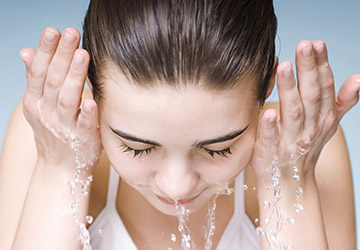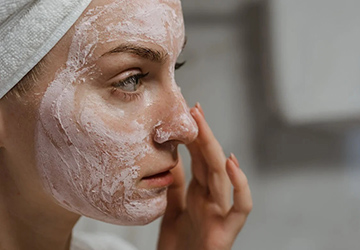Acne is more than just pimples; unfortunately, it's not limited to young teenage girls. Even in your late 20s, you can still wake up with a red zit on your face. Acne, pimples, and whiteheads can carry through your menopause. However, you can have clearer skin by following a steady skincare routine.
Scroll down for a simple and easy-to-follow 8-step daily skincare routine for acne-prone skin.

What is Acne, and How is It Caused?
Acne is a severe skin condition that affects many teenagers and young females. Dermatologists say, "Acne is a disorder of the hair follicles and oil glands (sebaceous glands)."
Unfortunately, Acne can affect anyone at any age, but it usually affects teens throughout puberty, with 85% of people between the ages of 18 and 24. Acne outbreaks can appear anywhere on the body, although most typically appear on the face, chest, shoulders, and upper back.
Sebum, an oil produced by your body's sebaceous glands in a natural process, is often expelled through your hair follicles. The accumulation of sebum and dead skin cells in these follicles can encourage the development of skin germs, including harmful bacteria.
Inflammation caused by the bacterium, commonly known as Propionibacterium acnes (or P. acnes), results in inflammatory acne lesions. Acne has many varieties, such as blackheads, whiteheads, papules, pustules, nodules, and cysts.
8-step Skincare Routine to Prevent Acne
Here's a simple and easy-to-follow, step-by-step skincare routine for acne-prone skin.
Wash your Face Gently
Make this a daily morning routine of washing your face with lukewarm water to remove any dirt on your face. No matter how tired you're, always wash your face after removing makeup or going to bed to remove excess oil from your face. Otherwise, it will clog your skin pores, leading to Acne and other skin conditions.
Apply an Acne Treatment Gel
If you have severe Acne on your face or body, it's better to consult a dermatologist and use any recommended medication or acne gel to treat Acne. Oily skin is more vulnerable to experiencing pimples. You can use herbal remedies to treat Acne but consult your physician first.
Don't Forget to Apply Nongreasy Moisturizer
Apply a nongreasy moisturizer to give your skin the necessary care and treatment. Face moisturizer prevents your skin from harmful UVA rays and damaging UVB radiations. Nongreasy moisturizers are best for acne-prone skin.
Remember to Apply Sunscreen
Make a habit of applying sunscreen before stepping out of your home or applying makeup or any beauty product. It will hydrate, calm and soothe your skin while protecting it from harmful radiations and maintaining your protective skin defense barrier. Choose a sunscreen that won't clog your skin pores or worsen your Acne.
Exfoliate your Skin Twice a Week
Exfoliating your skin is the most crucial step, but don't over-exfoliate, especially if you have acne-prone skin. Exfoliation should be done twice a week to remove dead layers of skin cells.
Cleanse your Face with Gentle Cleansers
Gentle cleansers give a deeper double cleanse to your face, remove excess oil and active breakouts, and heal acne scars. Thoroughly massage your face with mild cleansers before sleep, and rinse off with lukewarm water.
Apply Vitamin C Serums
Apply serums with high vitamin C concentrations, a potent antioxidant and necessary nutrient for healthy skin. These serums are made to be applied topically to the skin, where they can assist in balancing the skin tone, minimize the look of fine lines and wrinkles, and provide protection from the harmful effects of the environment.

Hydrate your Face with Toner
Toner is the perfect skincare product to keep your skin hydrated. It is usually recommended to apply after thoroughly cleansing the face and before applying moisturizer. After cleansing, it removes any unwanted dirt, makeup, or cleanser left on the skin. It also helps to balance the skin's pH and prepare it to absorb moisturizer better.
Importance of Having a Skincare Routine for Acne-prone Skin
Discuss why following a daily skincare routine is suitable for your acne-prone skin.
Keeps Pores Clean: Acne-prone skin produces more oil which can result in clogged pores and outbreaks. Excess fat, debris, and other impurities that may cause Acne can be removed by cleansing your skin twice daily using a mild, non-comedogenic cleanser.
Helps Prevent Scarring: Scarring from Acne is possible, mainly if it is not treated correctly. By getting rid of dead skin cells and encouraging cell turnover, an exfoliating step in your skincare routine can help prevent scarring.
Reduces Inflammation: Inflammation, which can result in redness, swelling, and pain, is frequently associated with Acne. Niacinamide and green tea extract are two examples of anti-inflammatory components included in skincare products that can help reduce swelling and soothe inflamed skin.
Provides Hydration: Many acne treatments can dry out the skin, which can worsen Acne and leave the skin looking flaky and dull. A quality moisturizer can help the skin retain moisture and reestablish its natural barrier function, reducing the likelihood of acne outbreaks.
Increases the Efficacy of Acne Treatments: Regularly employing a skincare regimen that contains acne-fighting elements like salicylic acid or benzoyl peroxide can help improve the efficacy of these treatments and enhance the general appearance of the skin.
Conclusion
Those with acne-prone skin must follow a skincare regimen. It can improve the efficacy of acne treatments and assist in maintaining clear pores, preventing scarring, reducing inflammation, and providing hydration. Have a healthy skincare routine!